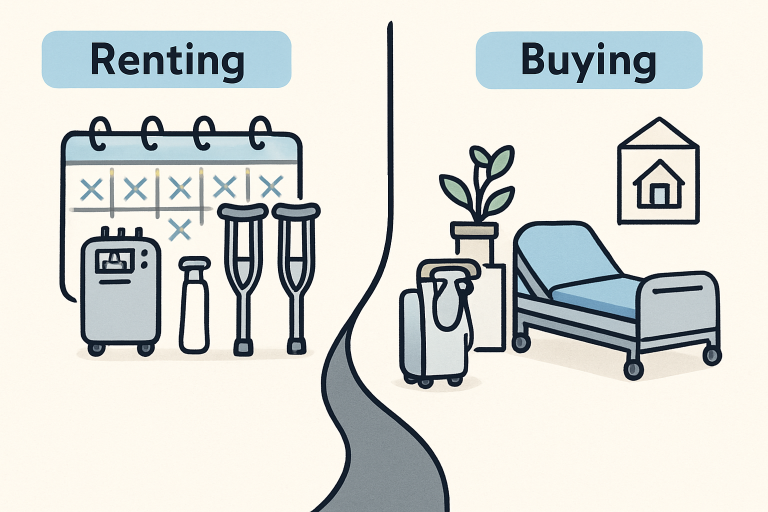Key Takeaways
- Choosing to rent or buy medical equipment depends on your specific needs, budget, and expected duration of use.
- Renting is ideal for short-term needs or when trying out new equipment, while buying offers long-term customization and availability.
- Consider hidden costs like maintenance and insurance coverage before deciding.
- Consulting healthcare professionals ensures the solution fits your medical requirements and lifestyle.
Why Consider Renting or Buying Medical Equipment?
Medical equipment plays a crucial role in enabling independence and supporting recovery at home for patients with various health challenges. Whether for post-surgical care, chronic condition management, or temporary mobility support, choosing the right approach for obtaining equipment directly impacts comfort, safety, and quality of life. For residents and families exploring hospital beds Cleveland OH, it’s important to consider the benefits and limitations of renting and buying from trusted providers. The choice between renting and owning isn’t always straightforward. Every situation has unique considerations, from budgetary constraints to the style and adaptability of the equipment required. Evaluating personal needs, financial resources, and expected duration of use will guide you toward the option that provides the most value and comfort.
What Types of Equipment Are Most Commonly Rented or Purchased?
The type of medical equipment you need shapes your decision to rent or buy. Some of the most common items include:
- Mobility aids: Wheelchairs, scooters, walkers, and canes enhance independence and mobility. Renting is ideal for temporary mobility, while buying may suit individuals requiring prolonged use or customization.
- Respiratory devices: Oxygen concentrators, CPAP machines, and nebulizers are essential for patients with respiratory conditions. Length of treatment and potential upgrades are major factors in the rent-versus-buy debate.
- Hospital beds and mattresses: Adjustable beds and pressure-relief mattresses support recovery and comfort at home. Options are available for rental and purchase, depending on the anticipated duration of care.
- Lift chairs and transfer devices: These devices assist with safe transfers and daily mobility, and the choice between renting and buying depends on expected usage time and required features.
Each product must be evaluated for both short-term effectiveness and long-term adaptability, considering changes in health or preferences over time.

What Are the Advantages of Buying Medical Equipment?
- Long-term economic value: If you anticipate extended or permanent use, purchasing equipment often results in lower overall costs than ongoing rental payments.
- Customization: Ownership enables full customization—whether modifying a wheelchair, selecting specialized mattress materials, or upgrading accessories according to personal preferences and comfort needs.
- No imposed time limits: With purchased equipment, support is available whenever needed, eliminating the inconvenience of return deadlines or contract extensions.
- Peace of mind for chronic conditions: Individuals managing ongoing conditions, like limited mobility or progressive neurological disorders, benefit from knowing their equipment is always on hand and tailored specifically for their use.
Buying medical equipment is ideal for those seeking independence, specific customizations, and long-term reliability.
Evaluating Financial Factors: Cost vs. Value
The decision to rent or purchase should include a detailed budget comparison. Costs can vary widely by device, condition, and provider. Renting generally involves lower upfront payments, but can add up over months or years. Buying requires a more significant investment initially, but often pays off for those requiring equipment for a year or longer. According to Verywell Health’s guide on medical equipment rental, checking with your insurance provider or Medicare/Medicaid is crucial, as some plans subsidize part of the expense or offer reimbursement for medically necessary devices.
Maintenance, Service, and Upgrades: Hidden Costs to Consider
- Rental agreements: These almost always include maintenance and service calls. This reduces the burden of tracking repairs and extends the device lifespan for users.
- Ownership responsibilities: Buyers are responsible for routine servicing, repairs, upgrades, or replacements. Check for warranties and available local service providers who can offer reliable support in emergencies or for regular upkeep.
- Quality of life: Ensuring maintenance and access to service providers is vital for safety, comfort, and independence. The CDC’s information on independent living aids highlights how reliable equipment and services can make a substantial difference.
Factoring in the availability and cost of service contracts, spare parts, and qualified technicians helps prevent unexpected expenses down the line.
How to Make the Best Decision for Your Situation
- Determine how long you need the equipment and whether a trial rental period is appropriate.
- Set a clear budget, factoring in possible insurance, Medicare, or Medicaid benefits.
- Assess your comfort level with maintenance—are you willing and able to arrange repairs if you own the equipment?
- Shop reputable providers and compare rental and purchase options side by side.
- Involve your healthcare team in the decision. They can provide valuable insight into the most suitable equipment and features for your medical condition or recovery goals.
Final Thoughts: Personal Needs and Preferences Matter Most
The right choice between renting and buying medical equipment is deeply personal and depends on your health needs, financial situation, and comfort level with equipment management. By carefully weighing the advantages and challenges of each route, you ensure your environment is equipped for both safety and independence. Consulting with professionals and exploring each option thoroughly provides confidence and assurance—for today and now. Each individual’s journey is unique, and the most important factor is choosing what aligns best with your needs and goals.









+ There are no comments
Add yours